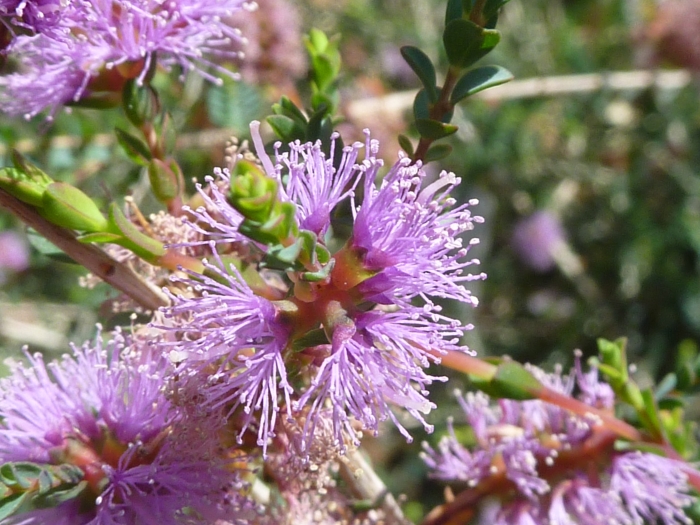Slender Honey-Myrtle
(Melaleuca gibbosa)
Slender Honey-Myrtle (Melaleuca gibbosa)
/
/

Magnus Manske
CC BY-SA 3.0
Image By:
Magnus Manske
Recorded By:
Copyright:
CC BY-SA 3.0
Copyright Notice:
Photo by: Magnus Manske | License Type: CC BY-SA 3.0 | License URL: https://creativecommons.org/licenses/by-sa/3.0 | Uploader: Magnus Manske | Publisher: Wikimedia Commons | Title: Melaleuca_gibbosa_(Myrtaceae)_flowers.JPG |
































Estimated Native Range
Summary
Melaleuca gibbosa, commonly known as Slender Honey-Myrtle, is an evergreen shrub native to the sclerophyll forests, coastal heaths, and swamp margins of Southern Australia. It typically grows to about 2 meters (6.6 ft) in height and features numerous slender, arching branches. The plant is adorned with oblong heads of mauve flower spikes that bloom in spring and may appear sporadically throughout the year. The flowers are moderately showy and attract pollinators. Slender Honey-Myrtle is a very hardy plant, adaptable to a range of soil types and conditions.
This shrub is valued for its resilience, being drought hardy, frost tolerant, and capable of withstanding waterlogging. It is often used in cultivation for habitat restoration, as a windbreak, or in ornamental gardens for its attractive foliage and flowers. It can be propagated easily from seed collected from capsules one or two years old, or from semi-hardwood cuttings. In cultivation, Slender Honey-Myrtle generally does best in full sun to part shade, with medium amounts of water, and in soils with slow or medium drainage. It is relatively low-maintenance, making it suitable for gardeners of all skill levels. However, it can become leggy if not pruned regularly, and it may be susceptible to webbing caterpillars and scale insects.CC BY-SA 4.0
This shrub is valued for its resilience, being drought hardy, frost tolerant, and capable of withstanding waterlogging. It is often used in cultivation for habitat restoration, as a windbreak, or in ornamental gardens for its attractive foliage and flowers. It can be propagated easily from seed collected from capsules one or two years old, or from semi-hardwood cuttings. In cultivation, Slender Honey-Myrtle generally does best in full sun to part shade, with medium amounts of water, and in soils with slow or medium drainage. It is relatively low-maintenance, making it suitable for gardeners of all skill levels. However, it can become leggy if not pruned regularly, and it may be susceptible to webbing caterpillars and scale insects.CC BY-SA 4.0
Plant Description
- Plant Type: Shrub
- Height: 5-7 feet
- Width: 5-7 feet
- Growth Rate: Rapid
- Flower Color: Pink, Purple, White
- Flowering Season: Spring, Summer
- Leaf Retention: Evergreen
Growth Requirements
- Sun: Full Sun
- Water: Medium
- Drainage: Medium
Common Uses
Bee Garden, Bird Garden, Butterfly Garden, Fragrant, Hedges, Hummingbird Garden, Low Maintenance, Showy Flowers
Natural Habitat
Sclerophyll forests, coastal heaths, and swamp margins in Southern Australia
Other Names
Common Names: Small-Leaved Honey-Myrtle
Scientific Names: , Melaleuca gibbosa, Myrtoleucodendron gibbosum,
GBIF Accepted Name: Melaleuca gibbosa Labill.